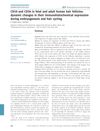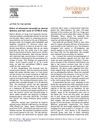 30 citations,
June 2015 in “British Journal of Dermatology”
30 citations,
June 2015 in “British Journal of Dermatology” Acne is common in women, often hormone-related, negatively affects quality of life, and requires various treatments.
 30 citations,
December 2001 in “Journal of The European Academy of Dermatology and Venereology”
30 citations,
December 2001 in “Journal of The European Academy of Dermatology and Venereology” Hormonal therapy is a good option for women with severe acne, especially when there's a chance of hormone imbalance.
 30 citations,
January 1998 in “Dermatology”
30 citations,
January 1998 in “Dermatology” Birth control pills and cyproterone acetate can help treat acne in women, especially when linked to hormonal issues.
 29 citations,
April 2004 in “Annals of Pharmacotherapy”
29 citations,
April 2004 in “Annals of Pharmacotherapy” Finasteride reduces hirsutism effectively with fewer side effects but is a second-choice treatment due to safety concerns.
 28 citations,
January 2015 in “Journal der Deutschen Dermatologischen Gesellschaft”
28 citations,
January 2015 in “Journal der Deutschen Dermatologischen Gesellschaft” Women with scarring alopecia have a lower quality of life and more anxiety and depression than those with non-scarring alopecia.
 28 citations,
March 2010 in “Histochemistry and cell biology”
28 citations,
March 2010 in “Histochemistry and cell biology” Skin cells can help create early hair-like structures in lab cultures.
 27 citations,
January 2002 in “Exogenous Dermatology”
27 citations,
January 2002 in “Exogenous Dermatology” Chronic exposure to sunlight may worsen male pattern baldness and protecting the scalp from the sun could slow it down.
 27 citations,
July 1982 in “British Journal of Dermatology”
27 citations,
July 1982 in “British Journal of Dermatology” The antiandrogen 11α-hydroxyprogesterone effectively reduces skin oil and cholesterol when applied to the skin.
 26 citations,
March 2009 in “Dermato-endocrinology”
26 citations,
March 2009 in “Dermato-endocrinology” The document concludes that diagnosing and treating Congenital Adrenal Hyperplasia is complex and requires a team approach due to its effects on the skin and other symptoms.
 25 citations,
June 2015 in “Clinical, Cosmetic and Investigational Dermatology”
25 citations,
June 2015 in “Clinical, Cosmetic and Investigational Dermatology” Microneedling helps increase the absorption of a melanin product into hair follicles, which may improve laser hair removal effectiveness.
 25 citations,
July 2008 in “British Journal of Dermatology”
25 citations,
July 2008 in “British Journal of Dermatology” CD10 and CD34 levels change during hair development and different hair growth stages, which could be important for hair regeneration treatments.
 25 citations,
January 2001 in “Facial Plastic Surgery”
25 citations,
January 2001 in “Facial Plastic Surgery” Both tissue expansion and serial excision are effective for scar revision in the head and neck area.
 24 citations,
November 2016 in “Molecular Medicine Reports”
24 citations,
November 2016 in “Molecular Medicine Reports” Hormonal imbalances, often indicating conditions like PCOS, are common in women with hard-to-treat acne, and a treatment approach addressing these imbalances may be needed.
 24 citations,
March 2015 in “Best Practice & Research in Clinical Obstetrics & Gynaecology”
24 citations,
March 2015 in “Best Practice & Research in Clinical Obstetrics & Gynaecology” Some skin conditions are common during pregnancy and can be safely treated without affecting the pregnancy outcome.
 23 citations,
February 2014 in “Journal of Pediatric and Adolescent Gynecology”
23 citations,
February 2014 in “Journal of Pediatric and Adolescent Gynecology” Low-dose finasteride reduces excessive hair growth in teenage girls safely and affordably.
 23 citations,
January 2008 in “Clinics in dermatology”
23 citations,
January 2008 in “Clinics in dermatology” Diet changes can help reduce acne by limiting certain hormones.
 23 citations,
October 2006 in “Journal of Dermatological Science”
23 citations,
October 2006 in “Journal of Dermatological Science” Ethosomal minoxidil improves hair growth by penetrating deeper into skin and shortening hair cycle.
 22 citations,
August 2013 in “International journal of gynaecology and obstetrics”
22 citations,
August 2013 in “International journal of gynaecology and obstetrics” Acne severity in women with PCOS is linked to younger age, lower body weight, and more body hair, but not to hormone levels.
 22 citations,
June 2013 in “International journal of molecular sciences”
22 citations,
June 2013 in “International journal of molecular sciences” Stem cell differentiation is crucial for skin barrier maintenance and its disruption can lead to skin diseases.
 22 citations,
January 2002 in “Treatments in endocrinology”
22 citations,
January 2002 in “Treatments in endocrinology” Birth control pills help treat skin and hair growth problems linked to high male hormone levels.
 21 citations,
November 2011 in “The journal of investigative dermatology/Journal of investigative dermatology”
21 citations,
November 2011 in “The journal of investigative dermatology/Journal of investigative dermatology” Telogen is an active phase with important biological processes, not a resting phase.
 20 citations,
April 2006 in “Dermatologic Clinics”
20 citations,
April 2006 in “Dermatologic Clinics” Antiandrogen therapies are beneficial for treating skin and hair conditions related to androgen levels.
 20 citations,
December 1997 in “Clinical Endocrinology”
20 citations,
December 1997 in “Clinical Endocrinology” Spironolactone may help reduce hair loss in androgenic alopecia.
 19 citations,
January 2015 in “Scientific Reports”
19 citations,
January 2015 in “Scientific Reports” GPR39 is linked to certain cells in the sebaceous gland and helps with skin healing.
 19 citations,
August 1993 in “Journal of Cutaneous Pathology”
19 citations,
August 1993 in “Journal of Cutaneous Pathology” Alopecia causes smaller hair follicles and affects growth-related structures.
 18 citations,
October 2014 in “Experimental Dermatology”
18 citations,
October 2014 in “Experimental Dermatology” Local skin glucocorticoid production is crucial for healthy skin, and its disruption can lead to skin diseases.
 18 citations,
January 2003 in “Gynecological Endocrinology”
18 citations,
January 2003 in “Gynecological Endocrinology” Low-dose finasteride effectively reduces hirsutism without serious side-effects.
 17 citations,
June 2017 in “Journal of pharmaceutical sciences”
17 citations,
June 2017 in “Journal of pharmaceutical sciences” Researchers developed a nanomedicine for acne treatment that delivers medication with less irritation and is non-irritating for oily skin.
 17 citations,
June 2010 in “Journal of Cosmetic Dermatology”
17 citations,
June 2010 in “Journal of Cosmetic Dermatology” Many women with hard-to-treat acne also have PCOS.
 17 citations,
April 2010 in “Archives of Gynecology and Obstetrics”
17 citations,
April 2010 in “Archives of Gynecology and Obstetrics” Obese women had more testosterone and less acne, but similar hair growth compared to non-obese women.






























